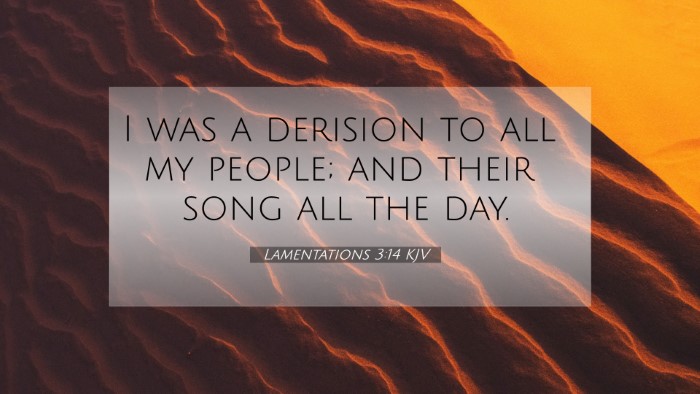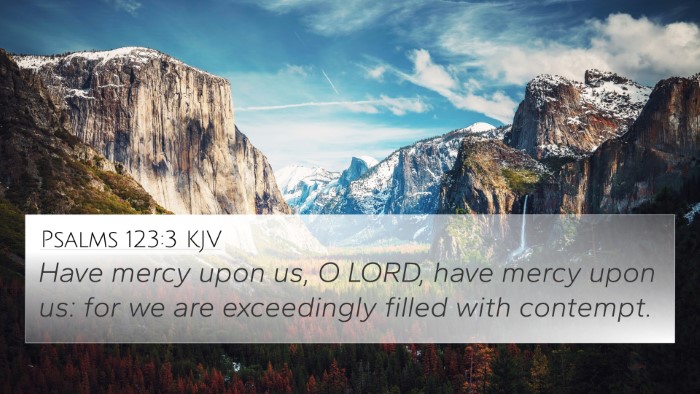Lamentations 3:14 Interpretations and Meaning
Verse: "I am become a derision to all my people; and their song all the day." (Lamentations 3:14)
This verse from Lamentations captures the profound sense of despair and isolation experienced by the prophet Jeremiah amidst the destruction of Jerusalem. It highlights a theme of abandonment and mockery, where the very people he sought to serve appear to turn against him, adding layers of sorrow to an already tragic context.
Summary of Insights from Public Domain Commentaries
Matthew Henry's Commentary
Henry delves into the emotional anguish experienced by Jeremiah. The prophet feels like an object of ridicule among his people, suggesting that the calamities they face have turned their hearts against him. This derision shows a painful reversal of roles, where the one who speaks the truth in times of difficulty is met with scorn. Henry emphasizes the importance of lamenting in prayer, as it aligns with the shared human experience of suffering.
Albert Barnes' Notes on the Bible
Barnes elucidates the corporate sense of suffering that Jeremiah embodies. He is not merely speaking of personal ridicule but rather a broader societal phenomenon where the people's lamentations become intertwined with their scorn for the prophet. He identifies this response as a symptom of their disillusionment and deep-rooted pain stemming from their sins. The connection indicates the theme of prophetic suffering, which resonates throughout the Scriptures.
Adam Clarke's Commentary
Clarke highlights the psychological and spiritual dimensions of Jeremiah's lament. He notes that scoffing at the prophet serves as a coping mechanism for the people who are overwhelmed by their circumstances. According to Clarke, Jeremiah's experience encapsulates the struggle of God’s messengers who often endure not only personal crises but also the rejection of those they strive to help. His reflections underscore the miraculous call of God and how it sometimes leads to sacrifice and derision from others.
Thematic Connections and Cross References
This verse resonates with various other scriptural themes and verses, further illustrating its importance in biblical literature. Here are some notable connections:
- Psalm 69:12: “They that sit in the gate speak against me; and I was the song of the drunkards.” - The idea of being mocked and lost within community ties praises the lament of the outcast.
- Jeremiah 20:7: “O Lord, you deceived me, and I was deceived; you overpowered me and prevailed.” - A direct reflection of Jeremiah's frustration at being used as a vessel of truth.
- Matthew 27:39: “And those who passed by derided him, wagging their heads...” - Parallel suffering seen in the New Testament with Christ’s crucifixion.
- 2 Corinthians 4:9: “Persecuted, but not forsaken; cast down, but not destroyed.” - The experience of prophetic suffering is echoed in Paul’s struggles.
- Luke 6:22: “Blessed are you when men hate you, and when they exclude you and revile you and spurn your name as evil...” - Jesus speaks on the blessing in persecution which resonates with Jeremiah’s lament.
- Isaiah 53:3: “He is despised and rejected of men; a man of sorrows, and acquainted with grief.” - Foreshadows the suffering of the Christ, aligning with Jeremiah's experience.
- 1 Peter 4:14: “If you are insulted for the name of Christ, you are blessed...” - The continuity of suffering for righteousness throughout scripture.
- Micah 7:10: “Then she that is mine enemy shall see it, and shame shall cover her which said unto me, Where is the Lord thy God?” - Reflecting on the shame and mockery faced by those faithful to God.
- Galatians 4:16: “Am I therefore become your enemy, because I tell you the truth?” - A direct connection to the struggle of the truth-telling prophet.
- Psalm 119:51: “The proud have had me greatly in derision: yet have I not declined from thy law.” - A reiteration of standing firm amidst ridicule.
The Importance of Understanding Context
When examining Lamentations 3:14, it is crucial to consider the historical and emotional context. This verse reflects both a specific time in Israel's history and a universal human experience of suffering. By understanding its context, believers can better appreciate the weight of Jeremiah's words and their significance in scripture.
Tools for Further Study
For those interested in deeper exploration, various tools are available:
- Bible Concordance: A comprehensive guide that allows users to find all instances of a word or theme throughout the Bible.
- Bible Cross-Reference Guide: Resources that help locate related verses and themes across scripture.
- Cross-Reference Bible Study: Methods of comparing and exploring connections between different biblical texts.
- Comprehensive Bible Cross-Reference Materials: Collection tools that provide insight into interconnected scriptures.
- Bible Chain References: A system of linking verses together for thematic study and sermon preparation.
Conclusion
The emotional resonance found in Lamentations 3:14 extends far beyond its historical context and into the lives of contemporary believers. By engaging with the themes of derision, truth, and prophetic call, individuals can gain profound insights into their spiritual journeys. Through the practice of cross-referencing biblical texts, one uncovers a deeper understanding of scriptural unity and God's enduring faithfulness in times of trial.
















